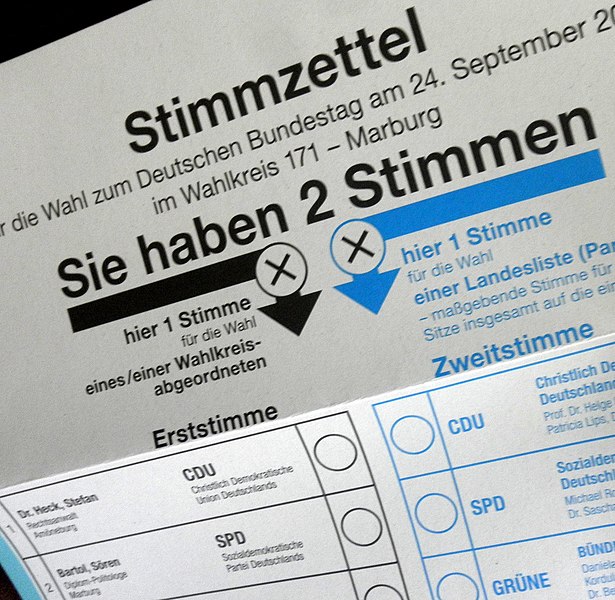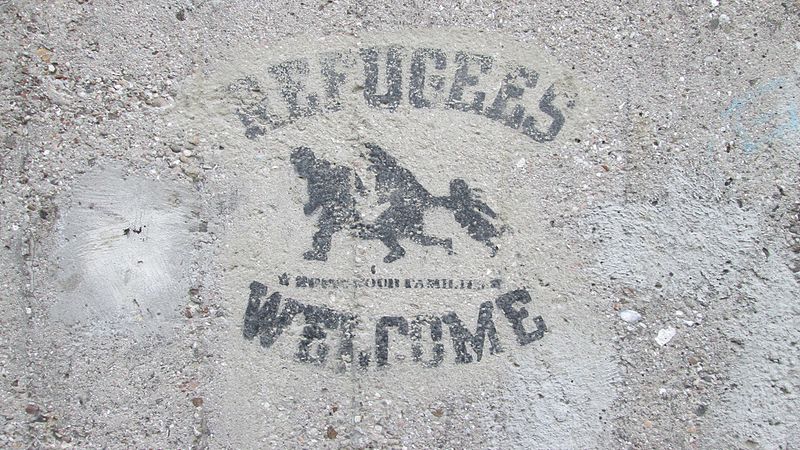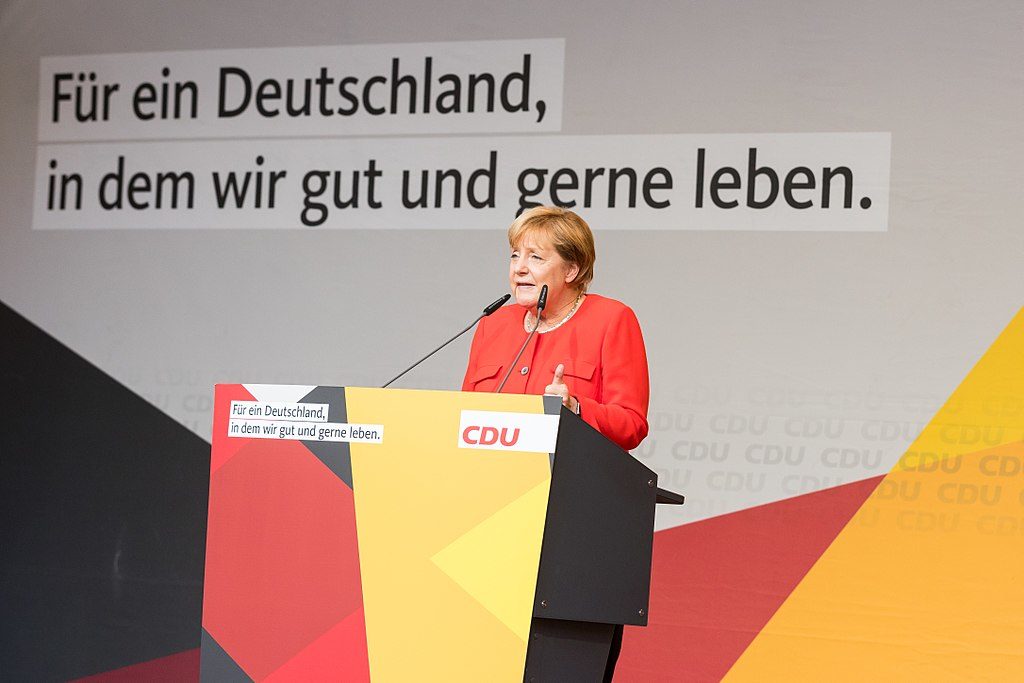Losses for both governing parties, right-wing-populists for the first time in the Bundestag (parliament) – the results of German elections some weeks ago remained issue of many debates. But what about the future government? Gregor is sharing some of his thoughts and opinions on this issue.

Germany has voted. But the results do not allow one of the classical coalitions. Will ‘jamaica’ be a solution? (Photo: Blumel1/CC)
GroKo is dead. The ‘Große Koalition’, a coalition of Conservatives and Social Democrats, has been governing Germany for four years with Angela Merkel as head, but after an(other) historical defeat the SPD of former European Parliament President Martin Schulz decided to regain power in opposition. Now it is up to four parties – two conservatives (CDU and CSU), a liberal (FDP) and the Greens – to work on a successful coalition agreement. But they gave up their talks after some weeks. A retrospect on this possible coalition:
Back to the Late 1990s?
The last coalition with the Greens has been seen as a government of hope, of awakening after 16 years of Helmut Kohl being German chancellor. Especially younger people saw it as a ‘wind of change’ for good-old Germany. Joschka Fischer on whom we reported some weeks ago as foreign minister has been one of the idols of that period.
Twelve years after Merkel gained power, the Greens have once more the chance to be part of the government. This time, there has been a serious number not only of my friends hoping for a new government – not lead by Martin Schulz; but by well-known Angela Merkel. She should have been governing with the Greens – but without the Liberals. Without a new chancellor and without any new green idol. That would have meant the perfect combination of continously competent administration and some innovation not only for the generation rose during the eternal reign of Angie.
Enemies Becoming Partners
As the elections results do not allow this ‘dream-team’ to assume office, the Liberals – in Germany classical coalition partner of the Conservatives and stylised direst enemy of the Greens – had to enter the coalition talks for a so-called Jamaica-government: Jamaica’s flag has the same colours as the parties probably joining the coalition. Their charismatic leader Christian Lindner brought the party back to parliament – probably immediately as well into government.
The question is now: Could the possible government be a coalition of innovations? What are main obstacles to reach the needed four-party agreement? I would just like to share two spotlights with you, which might as well be very relevant for Germany’s international partners:
1.001 Questions on Migration

Refugees still welcome? In 2015 a enorme number of German got spontaniously engaged in refugee support: the celebrated ‘Wilkommenskultur’. (Photo: WalterW.A / CC)
After the so-called ‘long summer of immigration’ Germany and Europe have done their best to arrive back to an ‘eternal winter of borders’ – known from the Cold War as one of the exceptional periods nearly without uncontrolled migration in European history. The positive German Willkommenskultur is not dead, but is at some point hibernating.
The success of the AfD mainly caused by the party’s argumentation against ‘mass-immigration, Islamisation and loss of German culture’ allows only a spot on German public, but wide parts of the population and politicians not only from the right criticise Angela Merkels crisis management in 2015 – the Greens remain almost the only party supporting the wide acceptation of refugees. Facing now the coalition talks, one could easily identify two main conflicts in the wide field of migration-questions: Do we need a maximum number (‘Obergrenze’) as requested by the CSU for refugees in Germany? Does Germany need an Immigration Law, as demanded by Liberals and Greens, and if yes, how to design it?
A ‘Obergrenze’
The question of a ‘Obergrenze’, a long time disputed as well between CDU and CSU, seems to be partly solved: the two conservative sister parties agreed on an orientation number of 200.000 successful asylum seekers. Liberals and Greens refer to international law arguing that a limitation of shelter is not foreseen.
As both parties – in contrast to the Conservatives – want to forester an Immigration Law, even if they do not agree on its details, to differentiate clearer between work migration and asylum, one could see a possible compromise: Introducing the legally non-binding orientation number the conservatives would somehow be satisfied. An additional Immigration Law allowing easier, legal paths for work-migration could help out getting the support by Greens and Liberals.
Closing the Window of Opportunities for the EU?
‘We are Europeans and believe in the ideas of European integration.’ – A sentence that might have been said from almost every politician of the future Jamaica coalition during the electoral campaign. Everyone expresses, that he or she is closely linked to European Union. But saying so, politicians have very different perceptions on what European Union could look like.
The Conservatives mainly want to continue running the European Union as it is: A union of states. By single projects such as a Defence Union or a European Monetary Fund a further integration might be on the schedule – but without changing the treaties. In contrast to Greens and Liberals who are advertising a European Federation. The Greens want a more social and ecological Europe, setting high standards, fighting climate change and reducing the agricultural subsidies at least for large-scale enterprises.

Angela Merkels CDU advertised with a Germany in which one can live well. With whom to work for it now? (Photo: Sven Mandel/CC)
Let’s Hope for the Best Results Possible
The FDP is also fighting subsidies in general but wants to install further free trade agreements as CETA or TTIP and to strengthen the subidiarity of the EU, including possible re-transfers of competences. The even more critical point is that the party argues to stop money transfers to the victims of the Euro crisis as Greece and is fighting for a strong austerity policy which might lead to serious dissent within the possible coalition. There are even speculations that the Ministry of Finance will be split in a budget-related and an international policies part if a Liberal will become minister – not to endanger a stable and at least somehow supportive Euro-zone.
This is as well to be felt reconsidering the visions for Europe introduced by the French President: While the Greens are supporting Macron’s ideas for Europe’s future nearly without constraints and the Conservatives felt prepared to make some concessions after labour market reforms, the FDP does not support the economical and financial ideas of Macron at all. We see: European Union will be a hardly negotiated issue. Let’s hope for the best results possible – even if it is hard to make a prognosis. After all it will be important who apart from Angela Merkel will co-design Europe’s policies as finance and foreign ministers.
Hopes Beyond
Migration and Europe are not the only critical issues to be solved in the upcoming coalition talks, but there are other aspects brought in by Greens and Liberals that could mean important steps for Germany’s future such as the digitalisation of administrations or new, more consequent concepts fighting climate change. Even if important questions e.g. the reform of the pension system will remain unresolved the Jamaica-government could be a successful one. I wish the awakening making Germany ready for its future to be voted in 2021 then – with the beginning of the post-Merkel-era.
Edit: After the failiure of the Jamaica-talks another GroKo, a minority government or a snap election are possibilities – no guess what might come out of the current situation.





